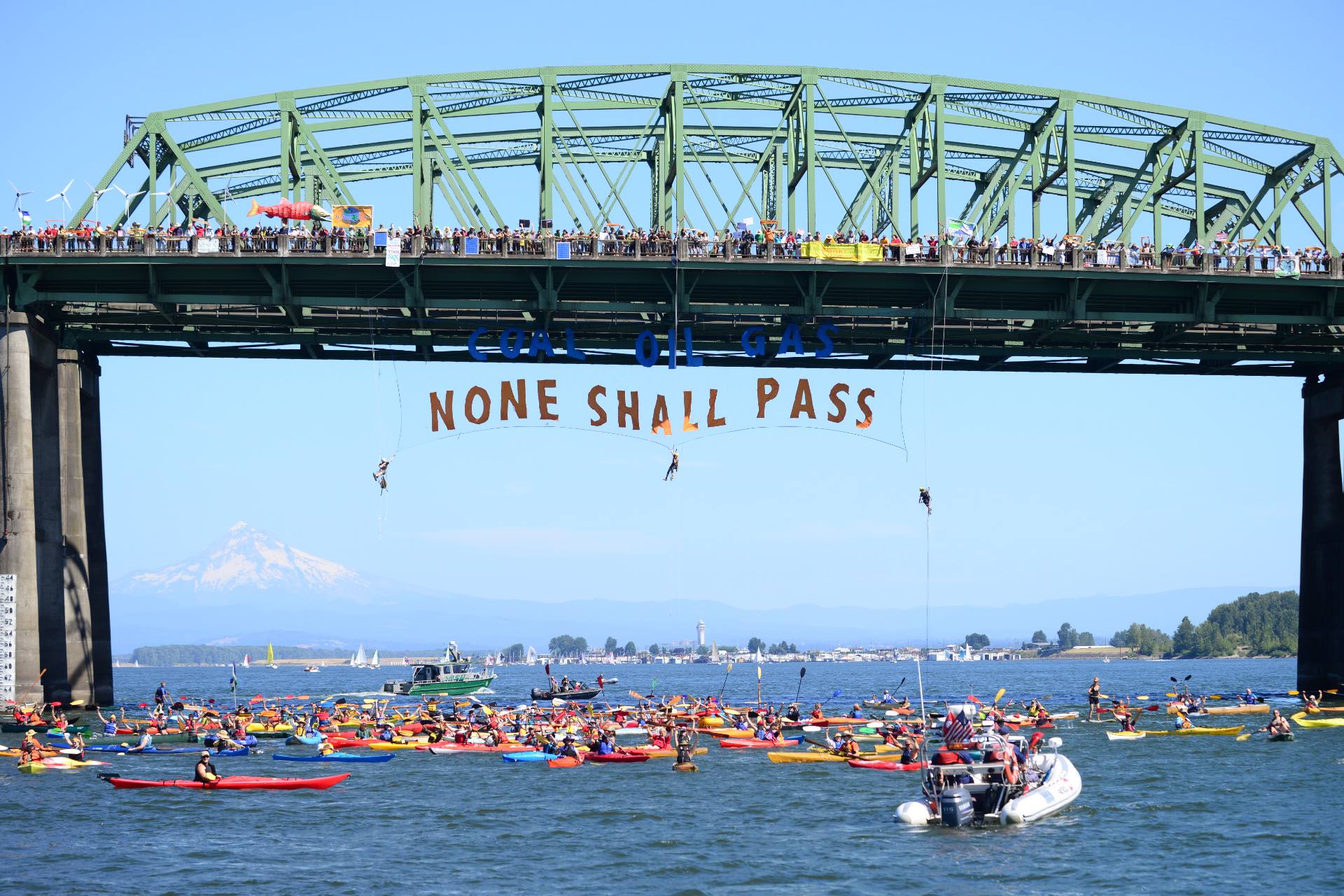This past weekend, activists in Vancouver, Washington dropped a banner off a bridge protesting fossil fuel exports on the Pacific Coast. While the action was directly responding to an approved oil export terminal in the Port of Vancouver, Washington there were speakers from along the Coast, including someone from the activist group, Rising Tide-Vancouver, Coast Salish Territories located in Vancouver, British Columbia who spoke about proposed projects to expand fossil fuel export capacity in B.C.
They spoke about the need to unite communities on both sides of the border, saying that “the impacts of these projects will not be isolated by these borders. Water contamination affects entire watersheds…The message I want to make is that the plans to industrialize by corporations are not isolated from each other, and therefore our resistance cannot afford to be isolated.” See the full speech here.
The fact that we should be fighting these fossil fuel port expansions across borders is particularly relevant for Canada. Take the Pacific Trails Pipeline (PTP), a proposed fracking pipeline which would bring fracked gas from Northeastern B.C. to a Liquefied Natural Gas (LNG) plant in Kitimat, B.C. You may not have heard a ton about this pipeline, even though it could potentially blaze a trail for the Enbridge Northern Gateway Pipeline by clear-cutting the route and setting up infrastructure required by any pipeline company that has been eyeing northern B.C. The PTP has already been approved by the National Energy Board, but Chevron and Apache (50/50 owners of the project) have faced Indigenous-lead opposition who have evicted pipeline surveyors off of their territories and set up log cabins and pit houses along the proposed route.
But PTP and its associated LNG facility is just one of the corporate and state-sanctioned plans that to use the Pacific Coast as its gateway to new markets. British Columbia, alone, has ten LNG proposals, six of which have already applied for export licenses. The Enbridge Northern Gateway Pipeline and the Kinder Morgan Trans Mountain Pipeline would export at least 1.4 million barrels of crude per day, and that excludes additional arms of the pipeline systems that industry has in mind. Coal export terminals and terminal expansions are being pushed through in Surrey and in Delta, but raising concerns from local residents concerned about increased tanker traffic and pollution from coal transport.
While residents of B.C. are united against Enbridge, activists throughout the region are constantly fighting projects which are slipping under the radar. From LNG and fracked gas exports to coal trains and terminals, the region has been demarcated by corporations as open for business. Trade agreements such as the Canada-China FIPPA and the Trans Pacific Partnership facilitate the destruction by entrenching corporate rights to the land, resources, and to operations that pollute and exploit water—particularly on the West Coast.
The region of Cascadia, what many of us know of as mainly Oregon, Washington, and British Columbia, is the apple of corporate eyes. The border is a powerful tool that corporations can ignore; however, activists and the media rarely share stories across this line. The stories we can share of resisting fossil fuel exports are incredibly powerful and show that we share common concerns.
It is rare that I hear stories about the many fossil fuel export terminals that people are fighting in Washington and Oregon. Rarely do I even talk about it myself. As someone who has been paying attention to the Kinder Morgan Trans Mountain pipeline proposal, I probably should be mentioning that the Sumas pump station (located about an hour outside of Vancouver, where I live) routes crude oil from the Trans Mountain pipeline system to Washington State and to a pipeline system in Puget Sound. I could also be mentioning that the Fraser Surrey Docks, would be the destination of U.S. coal trains. And there are many more ways we can talk about the how fossil fuels and extreme energy projects (or more accurately: the impacts these extreme energy projects have on water, land, and air) are connected across borders.
Additionally, export and cross-border transport of fossil fuels also allows extraction to be separated from the actual burning, ensuring fewer corporations or governments are actually held accountable for their contributions to the climate crisis and its associated weather events such as the floods in Calgary or Toronto. In discussing the Fraser Surrey coal ports, a city councilor for Metro Vancouver, Harold Steves was among councilors who argued fossil fuels must be kept in the ground, and warned that a stampede is coming by companies to “take that stuff out of the ground and burn it somewhere.“
Actions such as this recent action in the Pacific Northwest were part of Summer Heat, a call to take direct action against some of the largest climate polluters. People are becoming increasingly aware that some things are worth fighting for, and that some of the usual targets are not even worth dealing with. As climate legislation, politicians, and environmental regulations continue to degrade, people are taking direct action to protect their communitiess and they are doing so by building more widespread movements. It is becoming increasingly clear that the 1% are united and that corporations are talking to each other about how to increase their profits.
There is a clear cross-border communication on industry’s end — why wouldn’t it be the same amongst us trying to protect our communities?



